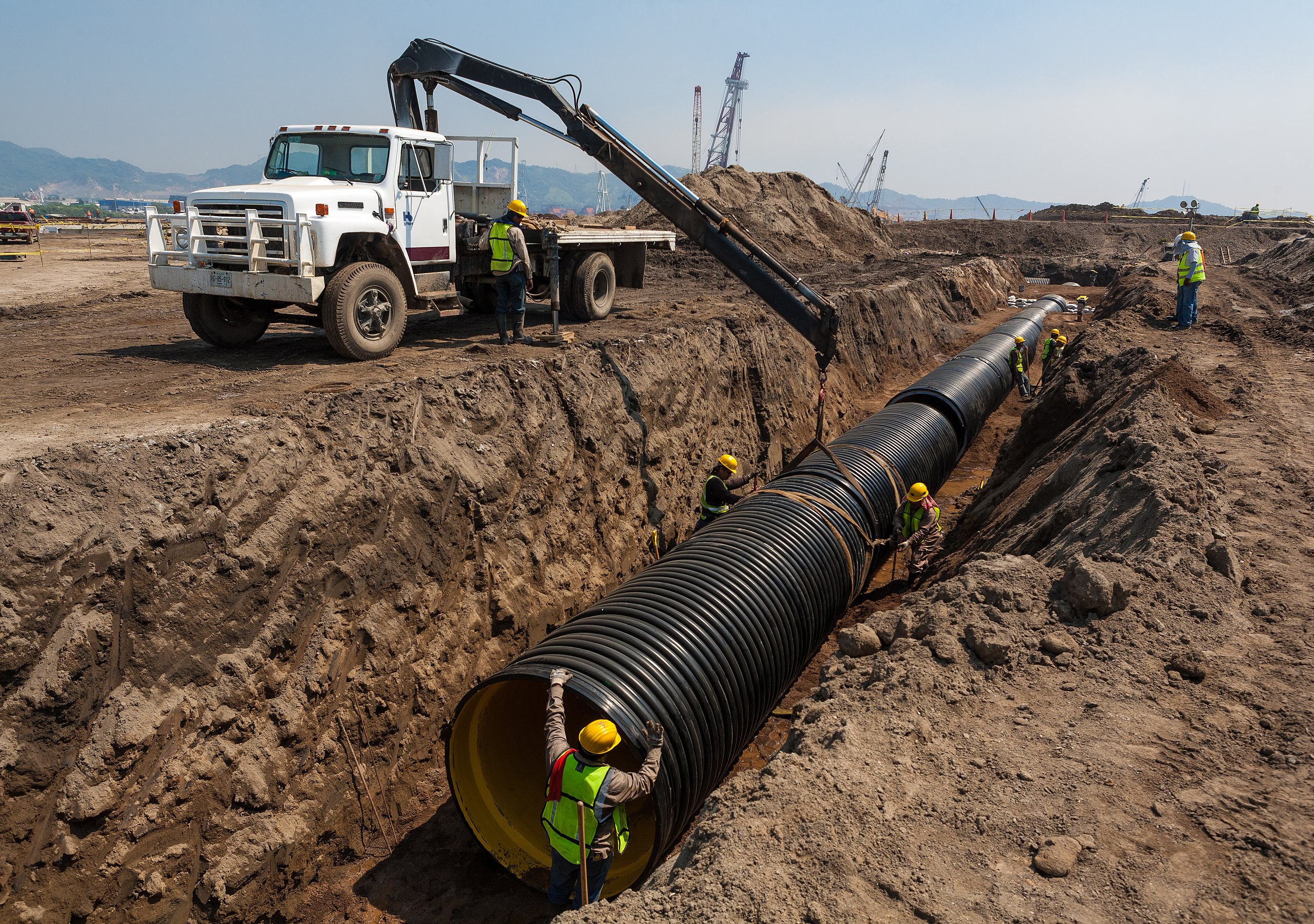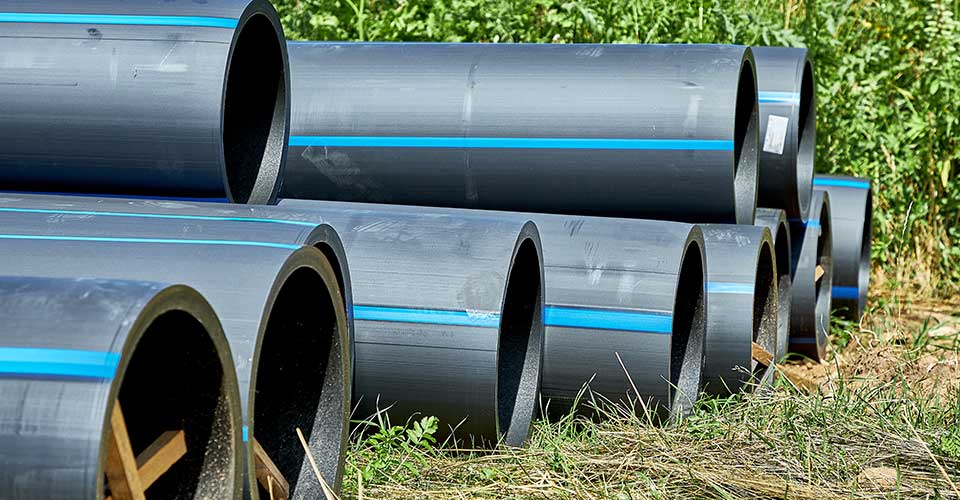Comprehending the Secret Conveniences of HDPE Pipe for Water and Wastewater Administration
Making use of HDPE pipe in water and wastewater monitoring presents many advantages that merit consideration. Its extraordinary resilience and long life expectancy make it a preferred option for many jobs. Additionally, the material's resistance to rust and chemical damage boosts its integrity in various settings. However, the advantages expand beyond just longevity and resistance. Exploring its cost-effectiveness and environmental impact exposes a lot more engaging reasons for its prevalent fostering in modern facilities
Outstanding Durability and Durability

HDPE pipe stands apart for its exceptional longevity and long life, making it a favored selection in water monitoring systems. Created from high-density polyethylene, these pipes can stand up to substantial stress and tension, guaranteeing dependable efficiency over time. Their robust nature allows them to withstand severe ecological problems, including temperature variations and soil movements, which can create other materials to stop working.
The lifespan of HDPE pipes commonly exceeds 50 years, supplying an affordable solution for towns and sectors alike. Additionally, the product's light-weight properties simplify installation, reducing labor prices and timeframes. This resilience minimizes the requirement for frequent repairs or replacements, additionally improving its economic charm.
In water management applications, the reliability of HDPE pipes means fewer disruptions and enhanced solution connection, making them indispensable to lasting infrastructure development. The combination of sturdiness and longevity solidifies HDPE's duty as a cornerstone in reliable water administration services.

Resistance to Deterioration and Chemical Damage
While numerous products succumb to corrosion and chemical damage over time, HDPE pipes exhibit impressive resistance, making them perfect for different water administration applications. This strength stems from the molecular framework of high-density polyethylene, which is inherently non-reactive and does not corrode like metals or weaken from exposure to extreme chemicals. As a result, HDPE is extremely efficient in settings with hostile materials, such as wastewater systems that might have acids, bases, and natural solvents.
Additionally, HDPE pipelines can withstand environmental variables such as dirt level of acidity and saline problems, even more improving their suitability for diverse applications (hdpe pipe fittings Midland TX). Their capability to keep architectural stability in time minimizes the risk of leakages and failings, which is crucial in ensuring the security and integrity of water distribution and wastewater management systems. Consequently, the resistance to rust and chemical damages substantially adds to the general performance and longevity of HDPE piping remedies
Cost-Effectiveness and Economic Advantages
When taking into consideration the monetary effects of water management systems, the cost-effectiveness of HDPE pipelines becomes evident. These pipes provide lower installment and maintenance expenses compared to standard materials like metal or concrete. Their light-weight nature streamlines transport and installment, resulting in minimized labor expenditures. Additionally, HDPE pipelines display a lengthy lifespan, frequently surpassing 50 years, which translates to fewer replacements and lasting financial savings.
Furthermore, the resistance of HDPE to deterioration and chemical damages lessens the requirement for expensive fixings and replacements. The pipelines also sustain efficient water flow, lowering power prices related to pumping systems. By reducing leakages and water loss, HDPE pipelines add to significant economic advantages for municipalities and sectors alike. Overall, the first plumber gas line repair investment in HDPE piping can produce considerable monetary returns over the life-span of the water monitoring system, making it a sensible option for sustainable infrastructure advancement.
Ecological Sustainability and Minimized Effect

Versatility and Adaptability in Setup
Due to the fact that of their distinct homes, HDPE pipelines supply remarkable convenience and versatility in installment, making them suitable for a large range of applications. Their lightweight nature enables easier handling and transportation, reducing labor prices and installation time. HDPE pipelines can be curved and shaped to fit numerous surfaces and task needs, which is specifically useful in testing environments.
Additionally, their resistance to corrosion and chemical damage permits installment in varied settings without the demand for specialized safety coverings. The ability to fuse joints creates a continuous, leak-free system, improving the total honesty and integrity of the installment. HDPE's flexibility also suits ground movement, lowering the risk of damages in locations vulnerable to changing dirt. Overall, these attributes make HDPE pipes not only versatile however also a favored option for water and wastewater administration systems.
Frequently Asked Concerns
How Does HDPE Pipeline Contrast to PVC in Water Monitoring Applications?
HDPE pipe offers superior adaptability, resistance to rust, and longevity compared to PVC. Its lighter weight promotes less complicated setup, while its long life-span lowers substitute prices, making HDPE a preferred option in water administration applications.
What Is the Life-span of HDPE Piping Under Normal Conditions?
Under typical problems, HDPE pipes can have a life-span ranging from 50 to 100 years. Their longevity and resistance to corrosion add to their long-term performance in different applications, making them a reliable option for facilities.
Are HDPE Piping Recyclable After Their Solution Life?
Yes, HDPE pipelines are recyclable after their life you could try this out span. hdpe pipe suppliers Midland TX. They can be refined and repurposed right into brand-new products, greatly reducing ecological influence and advertising sustainability within the sector, making them an environmentally friendly choice for piping solutions
What Is the Installation Refine for HDPE Pipeline?
The installation process for HDPE pipelines includes website preparation, trenching, pipeline blend or mechanical signing up with, backfilling, and pressure testing. Appropriate methods assure a durable and efficient system for transporting water and wastewater effectively.
Can HDPE Water Lines Be Used for Both Potable and Non-Potable Water Equipments?
Yes, HDPE pipes can be used for both safe and clean and non-potable water supply. Their versatility, toughness, and resistance to deterioration make them suitable for numerous applications, guaranteeing risk-free and efficient transport of water in different contexts.